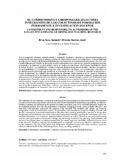| dc.rights.license | http://creativecommons.org/licenses/by-nc-sa/3.0/ve/ | es_VE |
| dc.contributor.author | Rivas, Yasmelis | |
| dc.contributor.author | Briceño, Jesús | |
| dc.date.accessioned | 2018-04-20T18:27:56Z | |
| dc.date.available | 2018-04-20T18:27:56Z | |
| dc.date.issued | 2018 | |
| dc.identifier.issn | 1690 – 3226 | |
| dc.identifier.uri | http://www.saber.ula.ve/handle/123456789/44646 | |
| dc.description.abstract | Esta investigación orientada cualitativamente y sustentada, axiológica, ontológica y epistemológicamente en la
interpretación fenomenológica se propuso generar un corpus teórico acerca del compromiso y la responsabilidad
docente en los Colectivos de Formación Permanente e Investigación en la educación media general, caso del Liceo
Cristóbal Mendoza de Trujillo. Su desarrollo requirió sumergirse en las vivencias del quehacer pedagógico docente,
recurriendo a la entrevista en profundidad y notas de campo con educadores seleccionados mediante el criterio
de la bola de nieve. La credibilidad y validez se constató mediante triangulación de datos y fuentes informativas.
La responsabilidad y el compromiso surgieron como elementos vinculantes con connotaciones específicas en
las manifestaciones personales que inciden en su desempeño docente, y la forma de concebir su pertenencia y
arraigo institucional. Se evidenció desconocimiento de referentes teórico-prácticos de los procesos formativos
y poca socialización de la información, marcado tinte político, así como el carácter continuo y permanente de la
formación con la participación activa de todos los profesores de manera dialógica; siendo esto fundamental para
la planificación, ejecución y éxito, de los planes de formación en los colectivos de formación, pero pocos asisten,
además muchos van por cumplir, sin involucrarse activamente en las actividades. Por tanto, la formación y el perfil
docente como fueron concebidos originalmente en los colectivos constituyen una utopía para esta institución. La
idea del profesor intelectual, deliberativo, reflexivo, que toma decisiones, parece lejana a la que se refleja en la
realidad de las políticas de formación. Una cosa se dice, otra se hace. | es_VE |
| dc.language.iso | es | es_VE |
| dc.publisher | SaberULA | es_VE |
| dc.rights | info:eu-repo/semantics/openAccess | es_VE |
| dc.subject | Compromiso | es_VE |
| dc.subject | Responsabilidad | es_VE |
| dc.subject | Colectivos de formación permanente | es_VE |
| dc.subject | Investigación docente | es_VE |
| dc.title | El compromiso y la responsabilidad como integrantes de los colectivos de formación permanente e investigación docente | es_VE |
| dc.title.alternative | Commitment and responsibility as members of the collective lifelong learning and teaching research | es_VE |
| dc.type | info:eu-repo/semantics/article | es_VE |
| dc.description.abstract1 | This qualitatively and supported, axiological, ontological and epistemological in phenomenological interpretation
oriented research aimed to generate a theoretical corpus about commitment and teaching responsibility in collective
Lifelong Learning and Research in the general secondary education, case Liceo Cristobal Mendoza Trujillo. Its
development required dive into the experiences of teachers pedagogical work, using in-depth interviews and
fi eld notes with educators selected by the criterion of the snowball. The credibility and validity was found by
triangulation of data and information sources. Responsibility and commitment emerged as binding elements with
specific connotations in personal manifestations that affect their teaching performance, and how to design their
membership and institutional roots. lack of theoretical and practical training regarding the socialization processes
and little information was evidenced, marked political overtones, as well as continuous and permanent training
with the active participation of all teachers dialogically; this being essential for the planning, implementation and
success of the training plans in collective training, but few attend, many will also fulfill, without actively involved
in the activities. Therefore, training and teaching profile as originally conceived in collective constitute a utopia
for this institution. The idea of the intellectual, deliberative, thoughtful teacher who makes decisions, seems far
which is reflected in the reality of training policies. It says one thing, another is. | es_VE |
| dc.description.colacion | 105-131 | es_VE |
| dc.description.frecuencia | Semestral | |
| dc.identifier.depositolegal | pp200202TR1298 | |
| dc.identifier.eissn | 2244 - 842X | |
| dc.publisher.pais | Venezuela | es_VE |
| dc.subject.facultad | Núcleo Rafael Rangel (NURR) | es_VE |
| dc.subject.institucion | Universidad de Los Andes | es_VE |
| dc.subject.keywords | Commitment | es_VE |
| dc.subject.keywords | Responsibility | es_VE |
| dc.subject.keywords | Collective Lifelong Learning | es_VE |
| dc.subject.keywords | Teaching Research | es_VE |
| dc.subject.publicacionelectronica | Academia | |
| dc.subject.seccion | Academia: Artículos de Investigación | es_VE |
| dc.subject.thematiccategory | Artes y Humanidades | es_VE |
| dc.subject.tipo | Revistas | es_VE |
| dc.type.media | Texto | es_VE |


